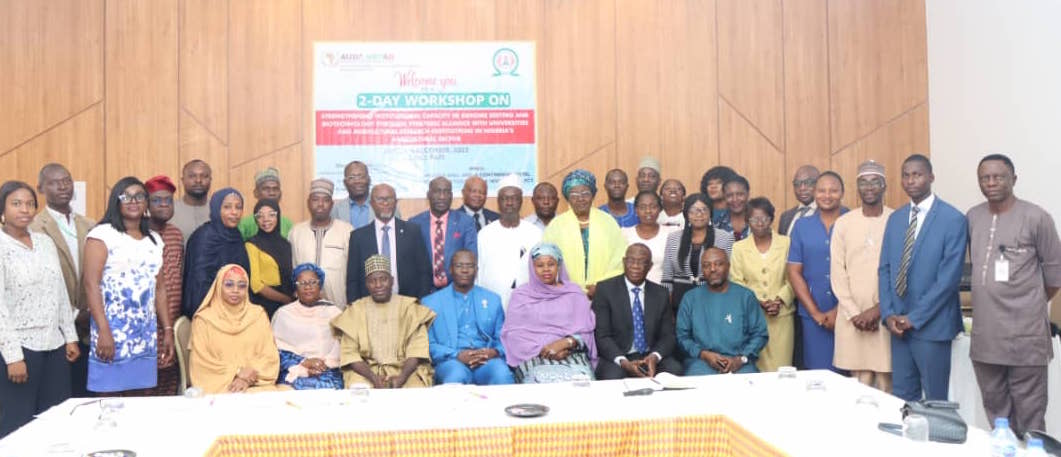|
Getting your Trinity Audio player ready...
|
Writes Toyin Omozuwa (Press Secretary to the DG/CEO NABDA)
Vice-Chancellors, Chief Executives, Deans of Faculties of Agriculture and sciences, academic and research leaders in selected institutions, as well as policymakers, regulators, and senior researchers, gathered on 7 December 2023, at the Abuja Continental Hotel for a Two-Day Workshop on Strengthening Institutionalised Capacity in Genome Editing and Biotechnology.
Organised by the African Union Development Agency (AUDA-NEPAD) in collaboration with the National Biotechnology Development Agency (NABDA), the workshop seeks to enhance Nigeria’s capacity in genome editing and biotechnology, marking a crucial step towards sustainable growth and innovation in the agricultural sector.
In his opening address, Prof. Abdullahi Mustapha, Director-General/CEO of NABDA, welcomed the participants and emphasised the urgency of their mission in light of President Bola Ahmed Tinubu’s recent declaration of a national food security emergency. This declaration underscores Nigeria’s responsibility to address the challenges in ensuring a secure and sustainable food supply.
The ongoing collaboration between AUDA-NEPAD and NABDA on the Genome Editing project, initiated over a year ago, has paved the way for strategic alliances within the country. Nigeria is one of eight countries in Africa being supported by the AUDA-NEPAD on an initiative to enhance the uptake of genome editing (GEd) to optimise agriculture through effective communication and advocacy.
The workshop serves as a platform for meaningful engagements among participants, aimed at strengthening institutionalised capacity and aligning with national and continental objectives. The ultimate goal is to accelerate industrialisation and improve livelihoods across Nigeria.
Prof. Mustapha encouraged active participation, knowledge exchange, and collaboration among the participants, stressing the importance of building bridges and breaking down silos. He noted that the success of the workshop depends on the collective commitment to collaboration, fostering a dynamic network that will drive innovation and sustainable development.
Supervisor, Centre of Excellence in Science, Technology, and Innovation at AUDA-NEPAD, Prof. Olalekan Akinbo, highlighted the objectives and outcomes of the workshop, emphasising the significant impact it will have on Nigeria’s scientific landscape.
Key among the objectives is to ensure that the teaching of genome editing is embedded in the nation’s university curriculum.
Expressing his optimism about the workshop’s impact, Prof. Akinbo stated, “This collaborative framework will pave the way for accelerated progress in genome editing research and development in Nigeria. By promoting a unified approach, we are fostering an environment conducive to innovation and scientific excellence.”
Genome editing and biotechnology hold immense potential to revolutionise agriculture and drive scientific advancements.
The workshop is expected to yield fruitful deliberations as participants work towards strengthening Nigeria’s institutionalised capacity in genome editing and biotechnology.
Speaking from Midrand, South Africa, Mrs. Florence Nazare, the Head of the Delegation of the African Union Development Agency (AUDA-NEPAD) said genome editing is part of actualizing a key priority of Agenda 2063 on the need to push for technological advancements from modern biotechnological innovations in plant and animal breeding. These have the potential to advance continental agricultural sustainability goals and contribute to rapid industrialisation.






